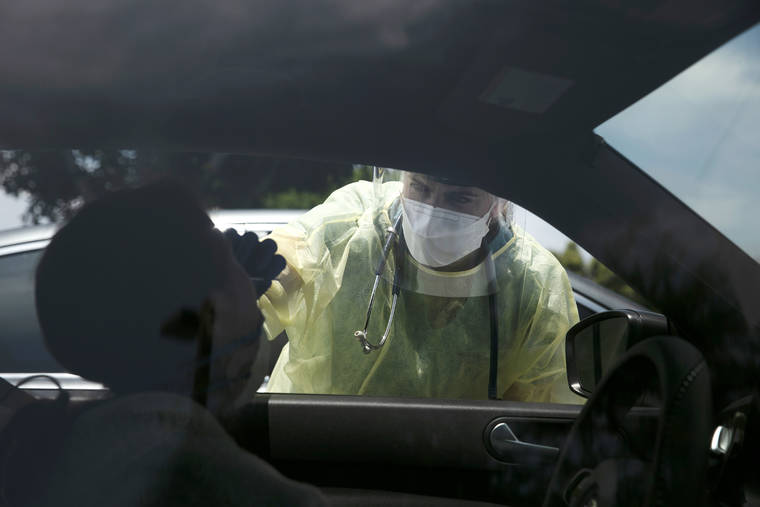LOS ANGELES — A technical problem has caused a lag in California’s tally of coronavirus test results, casting doubt on the accuracy of recent data showing improvements in the infection rate and number of positive cases, and hindering efforts to track the spread, the state’s top health official said Tuesday.
Health and Human Services Secretary Dr. Mark Ghaly said in recent days that California has not been receiving a full count of tests conducted, or positive results, through electronic lab reports because of the unresolved issue, which he did not describe in detail. The state’s data page now carries a disclaimer saying the numbers “represent an underreporting of actual positive cases” per day.
The latest daily tally posted Tuesday showed 4,526 new confirmed positives, the lowest total in more than six weeks and a precipitous drop from the record nearly 13,000 reported two weeks ago. County health officials have posted notices on their sites advising of the lag and that a drop in cases might not paint a full picture.
Wendy Hetherington, Riverside County’s chief of epidemiology and program evaluation, said she believes hundreds of cases a day haven’t been reported in her county since late last week. The undercount impedes the ability to find newly infected individuals and quickly contact those who have been in close contact with them so they can quarantine to avoid spreading the disease.
“We’re delaying case investigations. We’re delaying follow up,” she said, adding: “We can’t tell how well we’re doing until this issue is resolved.”
Even with the under-reporting of cases, California has recorded more positive tests than any other state, about 520,000.
On Monday, Gov. Gavin Newsom gave his most optimistic report on the state’s virus efforts since a second surge of cases in early June. He noted daily cases had dropped by an average of 2,200 in the last week and the infection rate of 6.1% was significantly lower than the nearly 8% recorded last month.
Ghaly acknowledged the rate Newsom highlighted was based on incomplete data and that missing data is being inputted manually. He stressed that looking at one- and two-week trends can help account for missing data from individual days.
Ghaly said hospitalization data — which doesn’t run through the same troubled system — has seen signs of improvement. The latest count Tuesday showed 6,302 people were hospitalized, a 12% drop from the high recorded in July. Deaths have now topped 9,500.
In California, laboratories send virus testing data and results to a state database that is accessible to county health officials. Counties including Orange and Sacramento have noted the delays, and Placer County posted on its website that its virus cases are likely underestimated as a result.
Los Angeles County health officials said the state convened an emergency call Monday night to discuss the issue. Now, a team from the county is reaching out to more than 80 labs to obtain test results for the past nine days to determine an accurate case count, and set up a system to receive data directly in the future so contact tracing efforts aren’t delayed, the county’s health department said in a statement.
Ghaly said the state was trying to fix the issue and relaying information manually to county health officials so they could follow up on cases and conduct interviews to identify people who had contact with an infected person, a process hampered by the data delays.
“We’re not sure when we will have a definitive fix to the problem,” he said.
Aside from the delays, the number of infections is generally thought to be higher than the reported cases because many people haven’t been tested, and studies suggest people can be infected without feeling sick. For most people, the virus causes mild or moderate symptoms, such as fever and cough, but for some, especially older adults and people with existing health problems, it can cause more severe illness, including pneumonia, and death.
In Riverside County, Hetherington said doctors are still getting notified of positive tests so they can inform their patients. She urged people to stay home if they are sick or test positive to avoid infecting others.
“It really impacts our ability to investigate cases and follow up with contacts and businesses where there’s been exposures,” she said. “Until this lab issue is fixed, we can’t really say what the true picture is.”


